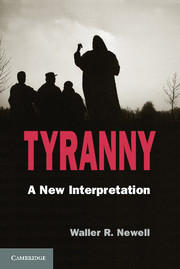Book contents
- Frontmatter
- Contents
- Acknowledgments
- Introduction
- 1 Is There an Ontology of Tyranny?
- 2 The Tyrant and the Statesman in Plato's Political Philosophy and Machiavelli's Rejoinder
- 3 Superlative Virtue, Monarchy, and Political Community in Aristotle's Politics
- 4 Tyranny and the Science of Ruling in Xenophon's Political Thought
- 5 Machiavelli, Xenophon, and Xenophon's Cyrus
- 6 Glory and Reputation
- 7 The Republic in Motion
- Conclusion
- Epilogue
- Bibliography
- Index
5 - Machiavelli, Xenophon, and Xenophon's Cyrus
Published online by Cambridge University Press: 05 May 2013
- Frontmatter
- Contents
- Acknowledgments
- Introduction
- 1 Is There an Ontology of Tyranny?
- 2 The Tyrant and the Statesman in Plato's Political Philosophy and Machiavelli's Rejoinder
- 3 Superlative Virtue, Monarchy, and Political Community in Aristotle's Politics
- 4 Tyranny and the Science of Ruling in Xenophon's Political Thought
- 5 Machiavelli, Xenophon, and Xenophon's Cyrus
- 6 Glory and Reputation
- 7 The Republic in Motion
- Conclusion
- Epilogue
- Bibliography
- Index
Summary
Readers of Machiavelli might well be struck by the prominent place occupied in his works by Xenophon. To be sure, this is more puzzling to present-day readers than it would have been to Machiavelli's contemporaries. Castiglione and other contributors to the “mirror of princes” genre typically linked Xenophon with Plato, Aristotle, and Cicero as being among the chief ancient authorities on good government. Humanists including Poggio, Bruno, and Pontano – often discussed as components of the Renaissance context surrounding Machiavelli – were admirers of Xenophon's writings and influenced by them. As a successful general and arbiter of the affairs of Persia, Xenophon was particularly admired during classical antiquity and again during the Renaissance for his balance of active and contemplative virtues, of particular concern to the Renaissance humanists’ wish to free a sphere for pragmatic statesmanship from the excessive restrictions of Christian otherworldliness. Still, given the paucity of Machiavelli's explicit references to other classical authors in contrast with his contemporaries among the humanists, his emphasis on Xenophon stands out, especially in contexts in which Plato, Aristotle, and Cicero seem especially conspicuous by their absence. For example, Machiavelli's famous complaint in chapter 15 of The Prince that “many have imagined republics and principalities that have never been seen or known to exist in reality” would seem especially to evoke the Republic of Plato, a “nowhere” and “pattern in the sky” that St. Augustine had adapted to Christianity as the otherworldly City of God. This statement occurs, moreover, in the midst of Machiavelli's refutation of the traditional catalogue of virtues including liberality, compassion, and honesty, a refutation aimed at both their original classical sources and their adaptation by Christian and humanist authors. Here, of all places, one would expect Machiavelli to criticize Plato, Aristotle, Cicero, and the Stoics explicitly. Yet it is Xenophon whom Machiavelli offers as his sole example of traditional “writers” about the virtues.
- Type
- Chapter
- Information
- TyrannyA New Interpretation, pp. 228 - 270Publisher: Cambridge University PressPrint publication year: 2013



